Time travel, contrasts, insights, and all the sports documentaries.
Prologue

Picture courtesy of geralt on Pixabay.
This is an intentionally browseable set of weeknotes regarding things I “beheld” over the previous “week”1.
I hope you find something in here that sparks your interest in a piece of media, or encourages you to avoid something when your time could be better spent elsewhere. I write the entire blog mainly to practice any kind of writing that isn’t work deliverables or quick emails - but if this helps you please let me know how on whatever medium I mentioned this on. There’s a whole set of links to my online presence up at the top right of this page.
To make it easier to browse, this is a summary of contents, using whatever taxonomy appealed to me this time:
The most notable media I watched…
Starting with a finale…
Owl House
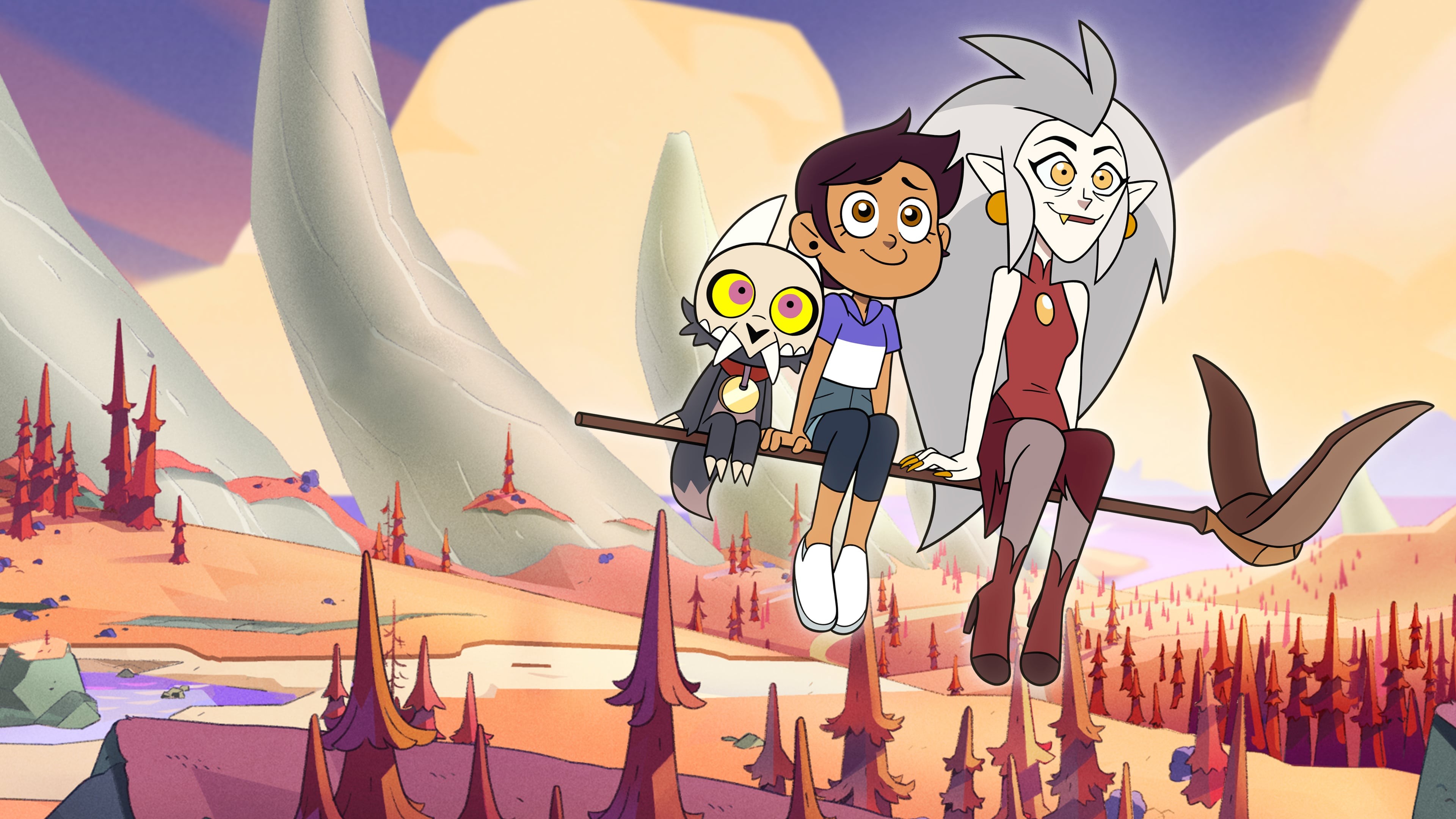
The Owl House.
The Owl House had a great finish… which is particularly impressive considering how it was handled by Disney. While it wasn’t exactly sabotaged, it appears to have been neglected by the company for having some queer themes - which is a pity, it was full of strong characters, well portrayed, and felt surprisingly like adult animation even with a relatively simple art style. I hope you watch it so I won’t say anything about the plot, but if you’ve Disney Plus treat yourself to an episode or two and see if it’s for you. If you’re watching with children there are adult themes dealt with throughout, such as love and loss and betrayal. The finale was effectively the entire third season, consisting of only three longer episodes to conclude everything. While they were clearly rushed, while unplanned I think that rush fitted the peril present. The plot is… I don’t know, it might be unique, but it’s certainly surprising.
Secret Invasion
At the other end of the scale for Disney output is the latest from Marvel ( at the time of writing ) Secret Invasion. I figure that either you’re familiar with the Marvel Cinematic Universe by now, or it would take me too long to explain in any detail quite who is doing what and why. So briefly - in this mini-series we follow Nick Fury, returning from space, handling the presence of a race of alien shapeshifters, known as the Skrulls. You’ll recognise them if you’ve done your homework and remember last seeing them in “Spider-Man: Far From Home”, and yes, it is essentially homework.
Anyway, I was intrigued by this as I like the idea of super heroes and similar characters worn down by so many years of this level of pressure - I think there’s something really interesting about smashing these mythical concepts right into realistic situations. But I was soon disappointed, the decision making by all of the characters in the series was so sub-par, so I ended up watching it all only to see how dismal it became, rather than out of excitement at what might happen. The possibilities of shape-shifting, and what you might achieve through it, felt poorly explored, and it had weird connotations and limitations that didn’t seem consistent - and none of the hope that Marvel usually has. Instead it seemed to be generally awful people making poor decisions before a weird conclusion. If you follow the MCU but this looks like a trudge, there are apparently “we know you didn’t watch this, here’s a summary before The Marvels comes out in 2024” articles out there.
Similarly I’ve decided I don’t have time to read any of the write-ups of how and why the series went wrong, but apparently more qualified people than I have been asking “what is this mess?”, and their articles aren’t hard to find.
Sticking with Marvel I also watched…
Ant-Man and the Wasp: Quantumania

Ant-man and friends.
Quantumania is a “good enough” film. I mean it’s visually impressive, and well acted - especially considering how much of the acting must have been in virtual locations with virtual counterparts. It only really requires the usual level of suspension of disbelief for Marvel, but the characters are affable and, as with other superhero properties, I like the realistic portrayal of decisions and their consequences playing out.
These posts are just a list of what I’ve watched with some attached thoughts, but also I mean them as a review, so you can judge whether you should watch or read what I have. But I figure that by now in the progress of the franchise you probably know whether Marvel is for you or not. If it is at all, then Quantumania is probably for you, at barely over two hours it sets its stall, and then the pace doesn’t really let up until the end. Anything that isn’t action is relevant exposition, which is noticeably well done here, I always felt like I was watching something be explained, not having it explained to me.
For those of you who’ve seen it, one disappointment for me was the battle tactics that make no real sense, just mass charges over mainly flat terrain. Not a big deal, but with such a variety of capabilities and super-powers to hand I just think there’s more intellectually engaging and visually interesting ways of pitting one force against another.
Avengers: Endgame
To contrast with the vapidity of Secret Invasion I started rewatching Avengers: Endgame, and ended up having the whole thing on in the background while I worked on something. It was interesting and disappointing to compare its well executed memorable scenes, from the very first scene to “on your left” at the end, while considering the sheer scale of the ambition and ideas in the film - with where Marvel appear to be now, where every film feels like a promotional vehicle for the next one.
Sports documentaries, so many…

Brian and the Boz is a documentary about one person, or maybe two, or maybe three.
Brian and the Boz
If you’re not a fan of the Oklahoma Sooners NCAA football team, or the Seattle Seahawks NFL team, you might not recognise who Brian Bosworth is, or what happened to him and his alter-ego “The Boz”. But Brian and the Boz is a great documentary currently on Disney+. This documentary covering the rise and fall of an American Football player feels really honest and open, providing an insight into the parenting of sports stars. In this case both his biological father, and his “adopted” father Barry Switzer.
The Redeem Team
I was, once again, wondering whether I can tame my distractability by putting something on in the background, and so started playing The Redeem Team … and ended up just watching it. This is the story of the 2008 USA Olympic Basketball team, looking to restore the reputation of the USA after disappointing in 2004. It’s an excellent documentary, well paced, great use of talking heads, makes sense even if you don’t know who’s who. It’s worth watching to see the personalities involved, or for examples on winning strategies and how a team is so much more than a collection of individuals… or just for fun, to see a well made telling of a real world story.
Quarterback
Quarterback on Netflix is an insight into one of the most difficult, and highly paid, positions in sport. Covering three relatively different players at the Quarterback position in the NFL, and their experience over the 2022 season. I realise it’s carefully edited, and their personas are managed, but still, it feels revealing. The three players covered are:
- Kirk Cousins - I kinda love how down to earth he is, and he seems happy in his own skin. Also I love how he and his wife seem to be the perfect compliment to each other for this kind of life.
- Patrick Mahomes - who for someone so aggressive and resilient also just seems like a really nice guy.
- Marcus Mariota - especially in contrast to Mahomes, it was good to see someone at the top, but struggling to find the right team or run of luck.

The three Quarterbacks.
Three aspects really struck me as I watched all eight episodes over a couple of days:
Fragility
This is far more in relation to their careers or performances than to their bodies. All it takes is a little bad luck, or one bad game, or one hit, and their careers can go in a completely different direction. This is a known factor in the game and in the position, but still this comparison between three players brought it home.
Insights
The shots chosen to illustrate their performance in games is really eye-opening sometimes, I’m so used to the fairly standard angles chosen for TV coverage of a game. But then in this show they sometimes picked a well framed waist high angle, especially with enough distance to show a large section of the crowd, and suddenly these “giants of the gridiron” look so small.
Kirk Cousins almost hiding his accomplishments away, in a “memory room” behind a hidden door.
And lastly how mundane some aspects of their lives are; even at this level for these players: they seem to play the game, go back to the locker room, get changed, give a press conference, and then if it’s a home game they meet their family, find their own vehicle, and drive themselves home… after being hit hard multiple times in front of millions of people, with hot takes about their performance already hitting all forms of media.
Contrast
What was really brought out through editing and the format was how much all three players had in common, the preparation the position takes, the effect on their lives, mindsets, and families. Also how all of them are mindful and appreciative of the support of the people around them, when they win and lose there’s a whole team of people behind them, outside of their NFL team-mates, that win and lose with them. But then the contrast between all three of them, the success of Mahomes dominating the last two episodes, whereas Mariota’s narrative just faded away; and the manner and language of Cousins compared to Mahomes.
Great series, I’m already looking forward to the next series… expected in July 2024.
I Tried Butler Academy
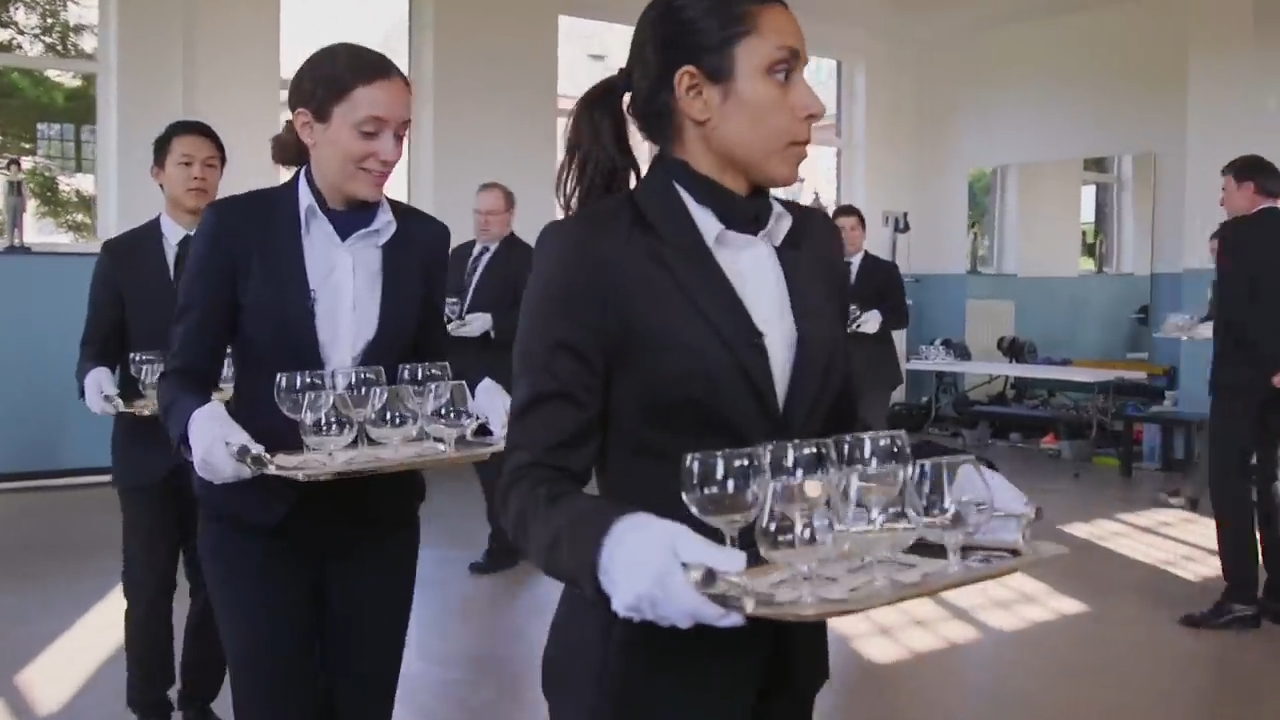
Practicing carrying a tray of glasses very quickly.
OK, this one isn’t sports at all. But I was really struck while watching Michelle Khare’s YouTube video “I Tried Butler Academy” that this was like watching elite players, with that single minded devotion to their task, and the level of training and attention to small details separating them from others. Like the best of these kind of documentaries, the professional or area investigated is taken at face value, rather than derided or otherwise looked down on.
How I became a professional Rocket League player in 2 weeks
This one is eSports, which I’d argue is sports. Here Maryanne from the Know Brainers YouTube channel shows us 2 weeks, in a 14 minute video, or her attempts to become an elite Rocket League player. An engaging presenter, a great insight into eSports, that helps show just how much effort and dedication is required to get to that level.
The Playbook
I finished watching Netflix’s The Playbook, that I actually started watching sometime before last December. This series covers well regarded sports coaches. The last two episodes covered tennis coach Patrick Mouratoglou, most well known for coaching Serena Williams but with many other successes too; and basketball Hall of Famer and coach of the University of South Carolina’s women’s basketball team Dawn Staley. Both characters are fascinating, very authentic and honest, and great examples of overcoming adverse circumstances. If you’re interested in this aspect of sports, or just want an inspiring story, either or both episode is recommended.
Home Game
Home Game is a great set of short documentaries on Netflix covering unusual or under-publicised sports. It’s certainly worth checking out. I watched the four episodes below that specifically intrigued me, if you’ve got access to Netflix do take a look.
Calico Storico
Calico Storico is a combination of soccer, rugby, and bare-knuckle boxing. As per my interest in “mob football” previously, I love that the history of this game goes back 500 years, maybe 2000, which gives an extra edge to the players’ passion as you watch the absurdity of a medieval sport in the 21st century. It’s played 27 a side, in just one period of 50 minutes, no substitutions for injuries or strategies. You score by getting the ball into the opponent’s net, or the opponent gets half a point if you miss, and each team essentially punches its way to the net.
Roller Derby

Is this a unique sport?
Another incredibly entertaining documentary, with a great balance between the subject and its context, and some of the personalities within it. Roller Derby is a really unusual sport I think, in that it’s kind of mobile wrestling, and it feels like a ball game but there’s no ball. This sport is particularly notable for its gender, speed, and the sharp contrast between how inclusive and supportive it is, but still how competitive the games are.
Kok Boru
A great contrast with Roller Derby, this is the sport of Kok Boru from Kyrgyzstan. It looks like Polo, but plays like a kind of mounted rugby, but with a dead goat as the ball. Another fascinating episode, and a great insight into the sport in such a short space of time. Similar to Roller Derby above, this is worth watching just to see a sport not quite like anything else, and to see a country that is rarely reported on in the West.
Pehlwani
While writing up these notes, I put this episode on in the background. As with Calico Storico and Kok Boru this is a sport with a history measured in centuries, but as with Roller Derby, very recent female empowerment, as it shows us the rise of women wrestlers in contemporary India. It’s a particularly good example of the benefits of representation and role models, citing Sakshi Malik’s bronze medal at the 2016 Olympics, the first medal for a female Indian wrestler, and the release of the female wrestling film Dangal, as giving young women the inspiration to try wrestling as a sport.
Other Documentaries
How To Catch A Criminal Cloner
This was a documentary on Nebula by Bobby Broccoli, covering deception and fraud in scientific research. It assumes some knowledge but nothing too onerous, and I’m not quite sure about the graphical metaphor used, but it works well enough and helps the viewer keep track of so many moving parts. If I remember correctly it would make more sense if you watch Part 1 first, which is signposted on the Nebula interface, but not in the video, so we missed that. Regardless, an amazing story of personal deception and systemic failures. Together both episodes are two and a half hours, but as with Kok Boru above - of all things - an insight into a culture and an event that I knew little about.
Stonehenge: The Lost Circle Revealed
Much closer to my home, I also kind of watched “Stonehenge: The Lost Circle Revealed” on BBC iPlayer, an hour long explanation of where the stones of Stonehenge actually came from, and the archaeological efforts to discover that. Of interest to me were the long timescales involved in this sort of work, being able to commit to a year or two on a project to confirm a hunch, and also the sheer amount of toil involved in archaeology. But also worth watching for the breakthroughs Professor Mike Parker Pearson made with his team, discoveries that essentially show the last one hundred years of academic theory on this subject was mistaken.
Books

Picture courtesy of Prettysleepy on pixabay.
Billion Dollar Lessons
Billion Dollar Lessons covers a subject close to my heart - bad business decisions and the poor processes and methods that enable them. It’s a write up of the authors’ impressive research into thousands of poor business decisions and their outcomes. I like the idea, but the “airport book” format didn’t work for me and I’m not sure it suits the material… for my interests anyway. I ended up skipping through a lot of it, but there’s some really useful points in there. I’ll be putting a mini-review together as a separate post.
Leading the Rebellion: Questing to Succeed in Work and Life
Another book I’ll be doing a separate review of, but this idiosyncratic combination of advice and autobiography is a useful and inspiring read. More to follow.
Football Outsiders Almanac 2021
The Football Outsiders Almanac 2021 is an incredibly comprehensive guide to the FO staff predictions for the 2021 season. I won this in a competition, and FO kindly shipped it from the United States. Interesting to see just the size, but as well as explanations of all the advanced analytics they use, you can read up on those here. Eye-opening even if you skim it, to see how deeply you can analyse sports - if you read it in more detail I look forward to seeing what you think of “running backs don’t matter” or “counting statistics versus rate statistics”.
Winning Defensive Football

Winning Defensive Football.
I’m in the process of sporadically working through the huge “Winning Defensive Football”, partly for research, partly for interest in the sport. It’s good to have a book that goes deeper than I need - i.e. the eight types of move by defensive line. It’s surprising sometimes in what is and isn’t explained - the names of different types of blocks by Offensive Linemen are used without explanation, but the very comment gap and position numbers system is:

The letters for the gaps, and numbers for the positions known as techniques, from pff.com.
…. which feels like it was established by the time this book was published in 2010. From what I’ve read so far, I liked the emphasis on attitude and teamwork, which is what I always see from higher level practitioners in any field.
Fire and Stone
I also finished Christopher Duffy’s “Fire & Stone: The Science of Fortress Warfare 1660-1860.”, the title summarises the book’s subject nicely. It’s not meant as an introduction, so for me some of the language was obscure. I’m out of practice reading academic books, so only thought to look for a glossary part way through reading, but even then I was glad of being able to look up terms online. Reading this sporadically at bedtime probably wasn’t ideal, it’s very short on diagrams and was published back in 1980 for a select audience. But even then there’s some real highlights from an expert on the subject, for example these two contrasting quotes from either side of combatants in a siege. Legendary siege engineer Vaudan has just forced Fort William, under Coehoorn, to surrender, and we read his version of events first:
The garrison of Fort William and their wounded chief came out on 23 June.
Vauban was curious to see Coehoorn, and after heaping praises upon him he asked him whether his attack could have been improved upon. Coehoorn replied that if the fort had been attacked in the ordinary way, by a trench directed against the curtain and two demi-bastions, he could have held out at least fifteen days more and inflicted heavy casualties on the French. As things were, he had been surrounded on all sides, and forced to give himself up.
Coehoorn’s son records the interview in rather different terms:
Vauban, amongst other pretty compliments about the defence, told Coehoorn that he could console himself for his capitulation with the thought that he had had the honour of being attacked by the greatest king in the world. Coehoorn replied that he was sensible of the distinction, but went on to say that he was particularly honoured to have compelled Vauban, the greatest of all men in siege warfare, to have changed the sites of his batteries seven times before he could force the fort to surrender."
Caves of Steel
Issac Asimov’s “Caves of Steel” was apparently written to prove that Science Fiction isn’t an independent genre, but could be used as a setting for other styles, in this case Detective Fiction. This is a detective novel set on a future earth, following a detective and his off-world partner solving a murder, with a background of interplanetary politics behind it. Classic Asimov I gather.
Even though it’s over fifty years old… I don’t want to spoil it in case you consider reading it. It’s very well constructed, and plainly written - the plot rattles along. It has short chapters, but as opposed to several comments in my last weeknotes about a book being good for a commute or bedtime, not this one. “The book was first published as a serial in Galaxy magazine, from October to December 1953.” says Wikipedia, and it shows, almost every chapter ends on a cliffhanger. If, like me, you’ve not read much “classic” Sci-Fi and sometimes wonder what the fuss is about, this is one to try. So much more I could say, but if you want to dig into themes about AI and robotics, or connections to Asimov’s larger body of work, there’s plenty online already. Also I didn’t spend much time and effort jotting down impressions on the book because I was simply enjoying it so much.
( This is another book chosen for me by Prudence and the Crow , their random present services are recommended. )
Caves of Steel, the VHS Game

The hero of the story, and a robot assistant.
Off the back of reading the book I also watched this YouTube video of the Isaac Asimov Robots mystery VHS game. From the writeup and reviews on Board Game Geek it looks genuinely interesting, especially in its potential replayability because the VHS tape acts as a framework for revealing randomly or conditionally drawn cards. It’s clearly a small scale production from the late 80s, with all the technical restraints that implies, but good performances, and intriguing to see what you can do with relatively few resources and a lot of imagination.
The Never Game
Jeffrey Deaver’s “The Never Game” was similar to Caves of Steel above, a good story, and very much a page turner. It was bought for me as a murder mystery, but I’d describe it as thriller. The main character, Colter Shaw, is likeable, and someone you’re happy to read about, but comes across well as a unique thinker due to an unusual background. It’s set in Silicon Valley, and with an outsider’s perspective on the technology industry - that was explained proficiently and made a good background setting. As I say, it was a page turner, with frequent cliffhangers at the end of the short chapters, and so hard to put down. For me the reveal was a little less interesting than the chase, but I enjoyed this enough that that wasn’t the problem.
Folklore to dip into
Ostensibly as research for a “High Fantasy Football” game I’m working on, I took a look through both “Abbey Lubbers, Banshees, & Boggarts: An Illustrated Encyclopedia of Fairies”, described here and “A Treasury of British Folklore: Maypoles, Mandrakes and Mistletoe” described here. For me neither are a good read, but I think that was because I was skimming them for ideas. Certainly both are worth checking out if this area interests you.
A collection of other media worth watching
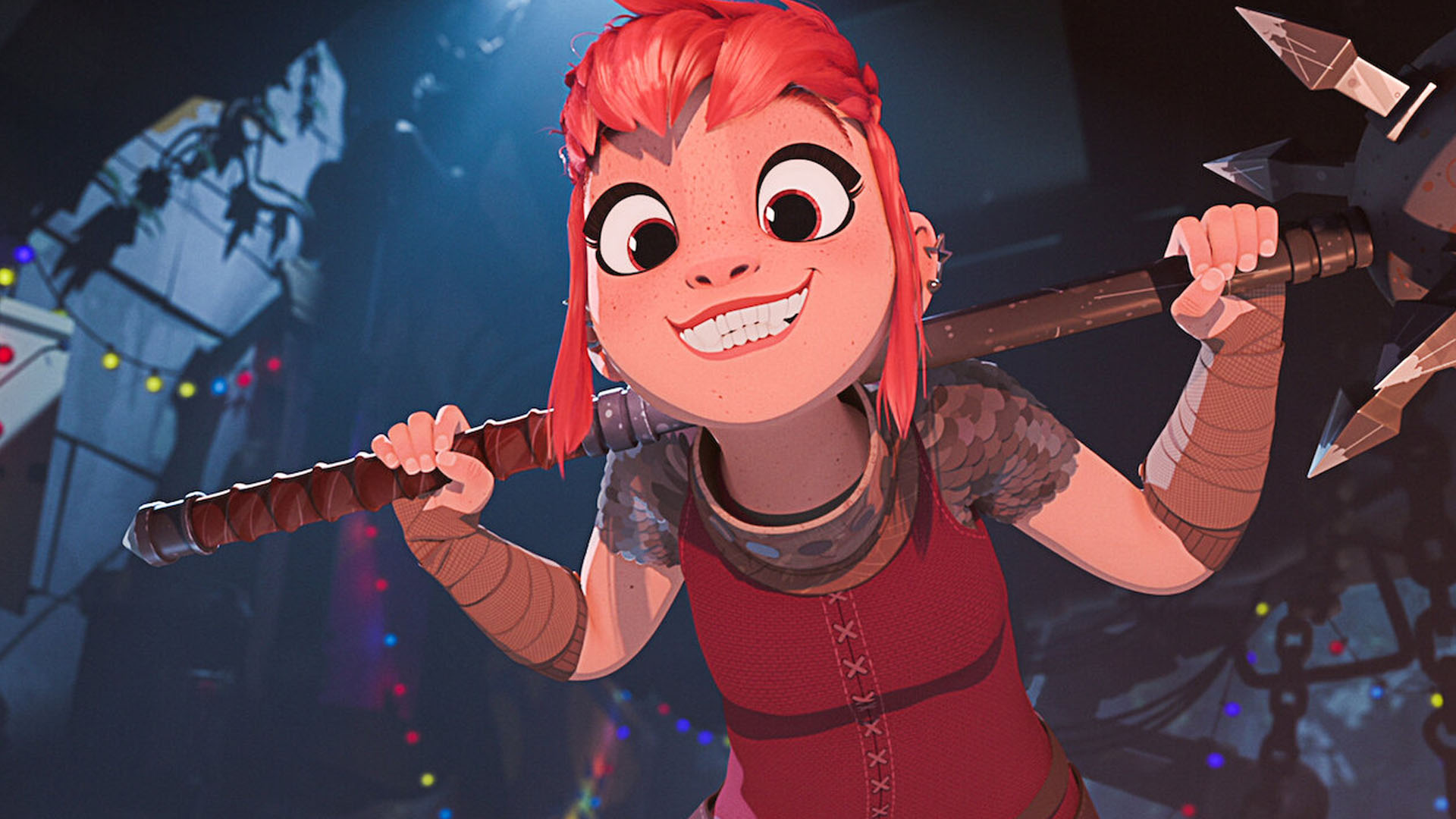
Nimona. Delightful.
Nimona
The eagerly awaited “Nimona” is on Netflix, a cartoon suitable for children but definitely not just for children. Outstanding and weird world-building, an interesting story, I enjoyed the characters, the character development, the plot. The film felt like it might have slowed in the middle but maybe that’s because the start was so relentless. I particularly liked how simple the story-telling was, without unnecessary artifice or trying to be too clever or “knowing” or ironic. If you’re just an adult with a healthy suspension of disbelief this is worth your time, and I’d argue that beyond my summary you’re best going in cold, you’ll know if its for you pretty quickly, probably within the first five minutes, definitely within the first ten and a half minutes. Be warned, it does contain feelings and peril.
If you have to, watch the trailer, and only if you watch the trailer, go to this footnote2.
And don’t watch this review if you plan to watch the film, maybe watch it afterwards, as Mark Kermode’s review was spot on with what I got out of the film.
The Future is a Dead Mall - Decentraland and the Metaverse
This video is another outstanding Folding Ideas video. I think this is objectively an incisive summary of the state of the metaverse, although I have a soft spot for this combination of heavy research combined with subtle snark.
Watching this video kind of makes the Metaverse or Virtual Reality make more sense. Similarly on how DAOs work, or don’t.
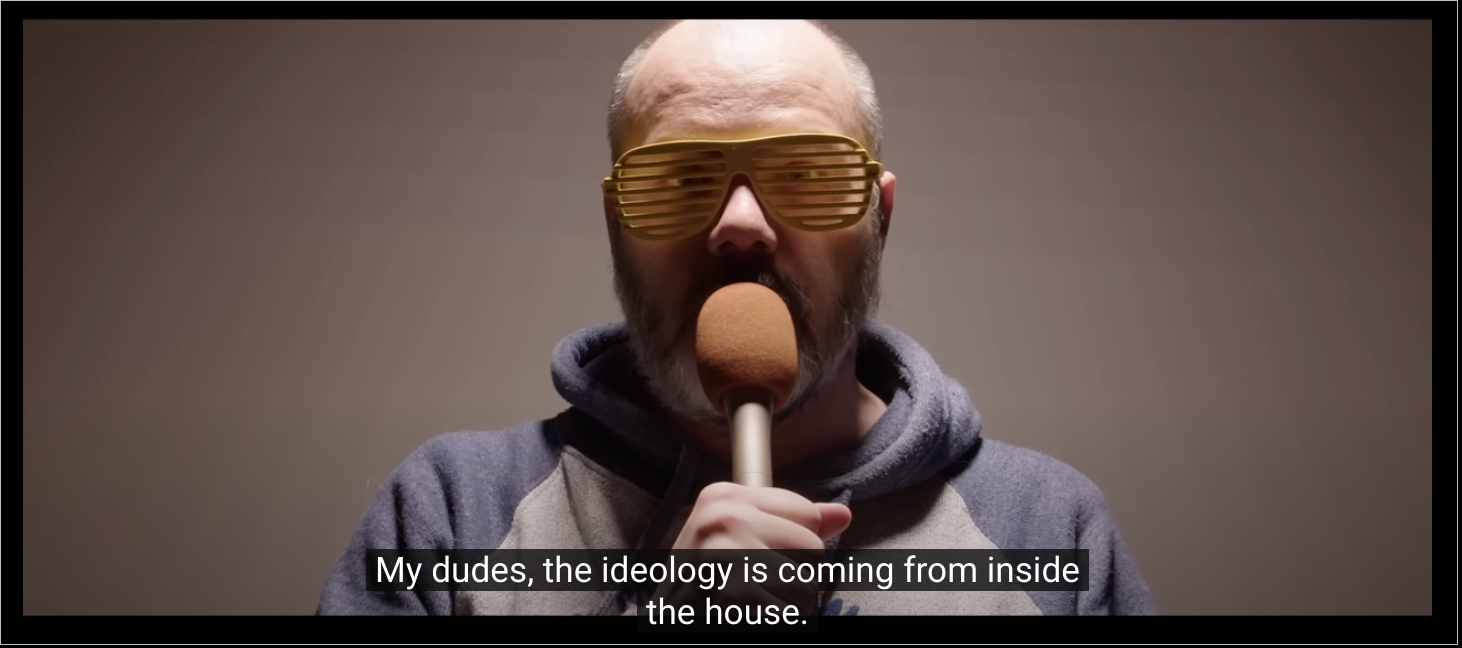
Dan Olson covers metaverse governance.
On DAOs, one highlight, section 5, “A Child’s Vision of Governance” is especially good - and it’s always interesting to see what people define “politics” as, and what is and isn’t political to them.
( and if “The Future Is A Dead Mall” is too long at almost two hours this 15 minute video is still my go to for making sense of VR, especially regarding games )
Rainbow Road: The Game Behind Cyber’s Colour Theory by Ana Vijay
Great to see this presentation from the Rookie Track at the BSides London security conference. These are the fresh ideas you get from specifically supporting new speakers. Covering how cyber security companies present themselves online, their standard look of “well everything’s blue and there’s a lot of padlocks” is kind of known, but here we have something obviously researched, and that can be cited. I liked the emphasis on how the choices made by companies for their colour schemes don’t really make sense, but appear to be conformity with previous choices that everyone has adopted, and no-one wants to stand out.
If you’re not interested in the cyber side, but do public presentations, do watch it for “pick a colour on your phone screen, now show it to me” as a way of getting audience feedback. I’ll be keeping that in mind in future….
Bo Burnham
I watched two of comedian Bo Burnham’s specials: “What.” and “Make Happy”. I love how unpredictable these are, in an apparently authentic way, and the experimentation with the form. If you like what Stewart Lee tends to do, you’ll like Burnham. I’d “run out of brain” one evening, so I watched these two in order; “Make Happy” was arguably in the same format as “What.” but so much better and more polished. I’ll be watching the rest of his work.
The Making of Vampire Survivors - Documentary
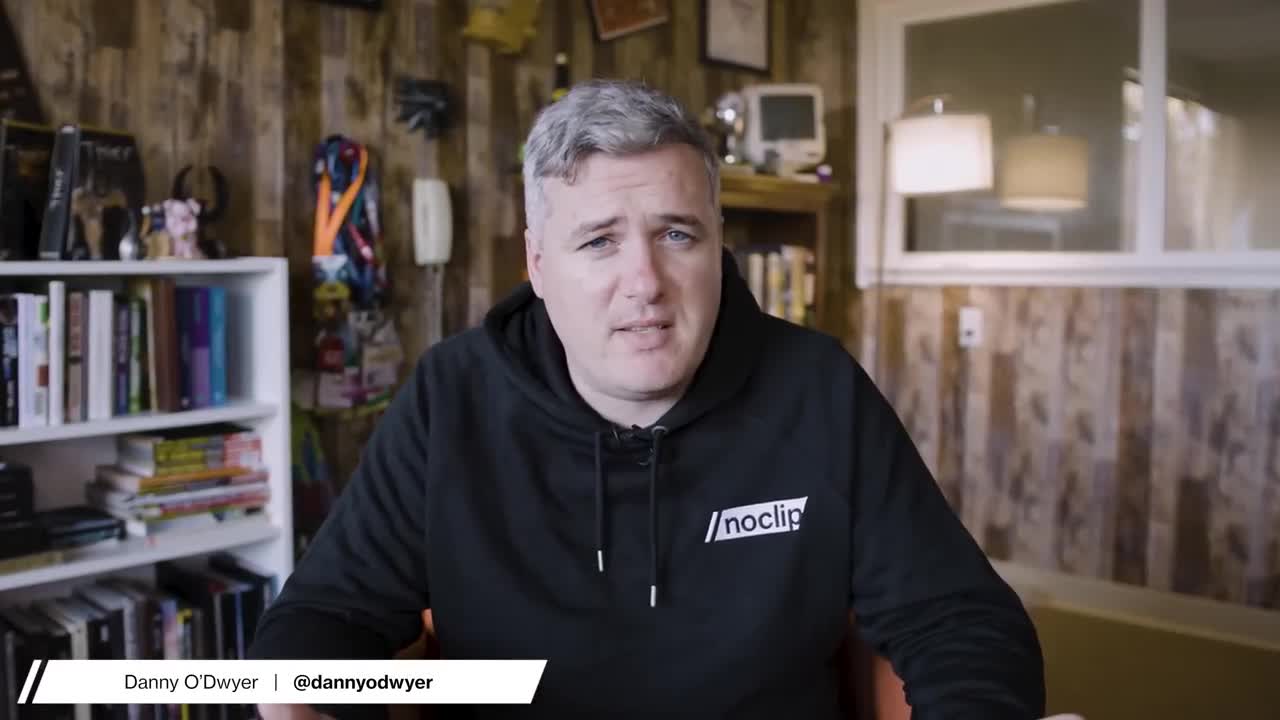
Great presentation and innovation by the documentarians here.
This well made 30 minute documentary by Noclip is an insight into the creation and development of surprise videogame hit Vampire Survivors. Vampire Survivors is an endearingly simple bullet hell game, originally by a single developer, that has gained a userbase of thousands and thousands of users. Great interview, and very respectful, the innovative way they show the camera-shy interviewee works well. And also the actual game shows what you can create if you keep the community in mind, and have realistic limits rather than “crunch”. That said, this documentary also reminds us how much effort it takes to turn an idea into a thing.
And contrary to everything I often say about documentary makers, Noclip putting themselves and their process into view - which is unavoidable considering the subject’s unwillingness to appear - works really well. As it did for Michelle Khare above.
They Cloned Tyrone
They Cloned Tyrone is, er, a “science fiction Blaxploitation mystery thriller”, kind of. Well acted, disconcerting, very much like Sorry To Bother You in some ways. The pacing feels erratic, and it’s a lot less fun than the trailer implies, which also tells you far too much, as they tend to. I enjoyed it, but I wasn’t enthralled by it… and I suspect by the end of the first sentence of this paragraph you knew if it was for you or not.
True Lies
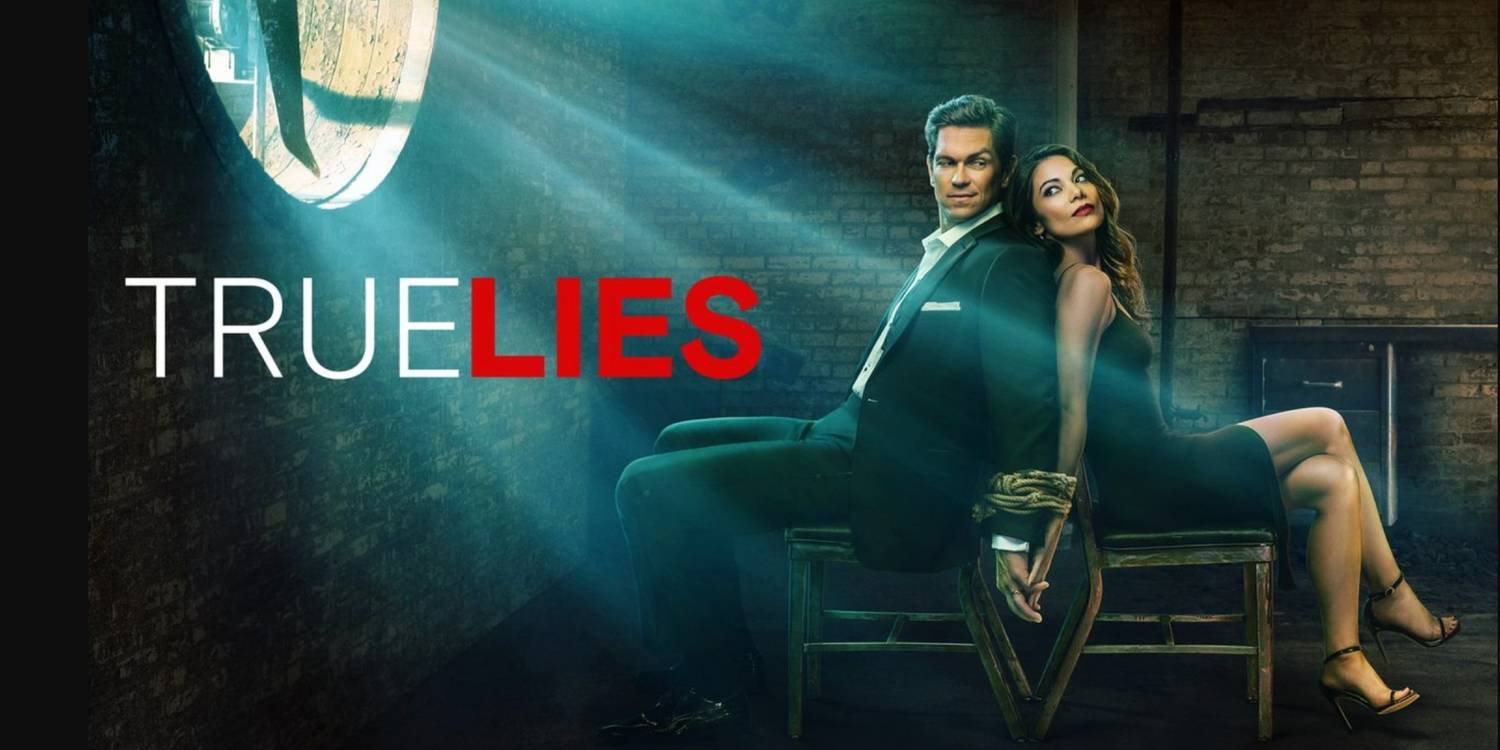
True Lies the show.
“True Lies”, on Netflix, is cute and fun - very much like the film it is inspired by that you’ve probably heard of - in contrast to the dark subject of contemporary international espionage. Likeable characters, reasonably ridiculous plots, but a fun watch if you don’t want something too demanding. Unfortunately there will apparently not be a second series.
Star Trek: Strange New Worlds
Really I could just repeat here what I said last time about “Star Trek: Strange New Worlds”:
likeable characters, involving plots, and making the most of how much of the Star Trek universe is established. There’s a firm belief in the series of a quite ridiculous universe, omnipotent aliens, time travel, and so on - but Star Trek pulls off that setting because it’s internally consistent3.
“ST:SNW” is just a very, very good show. In some ways it feels very much like “traditional” Star Trek, with our heroes out-witting and/or out-thinking and/or out-negotiating their opponents. The writing is excellent, as are the choices - moving the emphasis of each storyline around the cast, while also maintaining enough plots over the entire series to keep both short term and long term narratives in our minds. All situations are played very straight, with masterful performances, with no literal or figurative nods to the audience or breaks of the fourth wall - which to me allows the show to go from terrorism to time travel, from war crimes to show tunes, and sweep you along with it. We’re peaking into a very weird universe very similar to our own, but it’s a coherent one.
I tend not to follow fan discourse online, but I gather there are many people with short memories or poor online searching skills - who think this is somehow groundbreaking. When about fifty years ago the show introduced us to an international crew working in unison, and such weird wonders as the Tribbles, I’m enjoying seeing that tone continue.
Things that kinda dropped out of the rotation
Maybe I’m warning you on what not to watch, maybe I’m just helping out my future self when I think “didn’t we try watching that?”.
Physical:100
I started watching “Physical:100”, a South Korean reality show of a kind, featuring 100 competitors taking each other on in physical tasks to win a prize. It worked as an insight into that culture, on the variety of approaches to competition, as well as the sheer variety of bodytypes, and even ages. But maybe not the right pacing for me, I don’t know if that’s South Korean culture or reality show editing culture.
Our Flag Means Death
Directed by, and staring, Taiki Waititi, “Our Flag Means Death” is a whimsical comedy around pirates and piracy, managing to deal humourously with the kind of dark subjects of that time and context. This makes it very entertaining, but it’s not something I missed when I wasn’t watching it, so I stopped. I’ve enjoyed some of Taiki Waititi’s work, “Hunt for the Wilderpeople” for example, “Free Guy” was great, and I think I enjoyed “Lightyear” more than most… but it feels like he’s become his own genre, and too big for anyone to say “no” to.
Merpeople
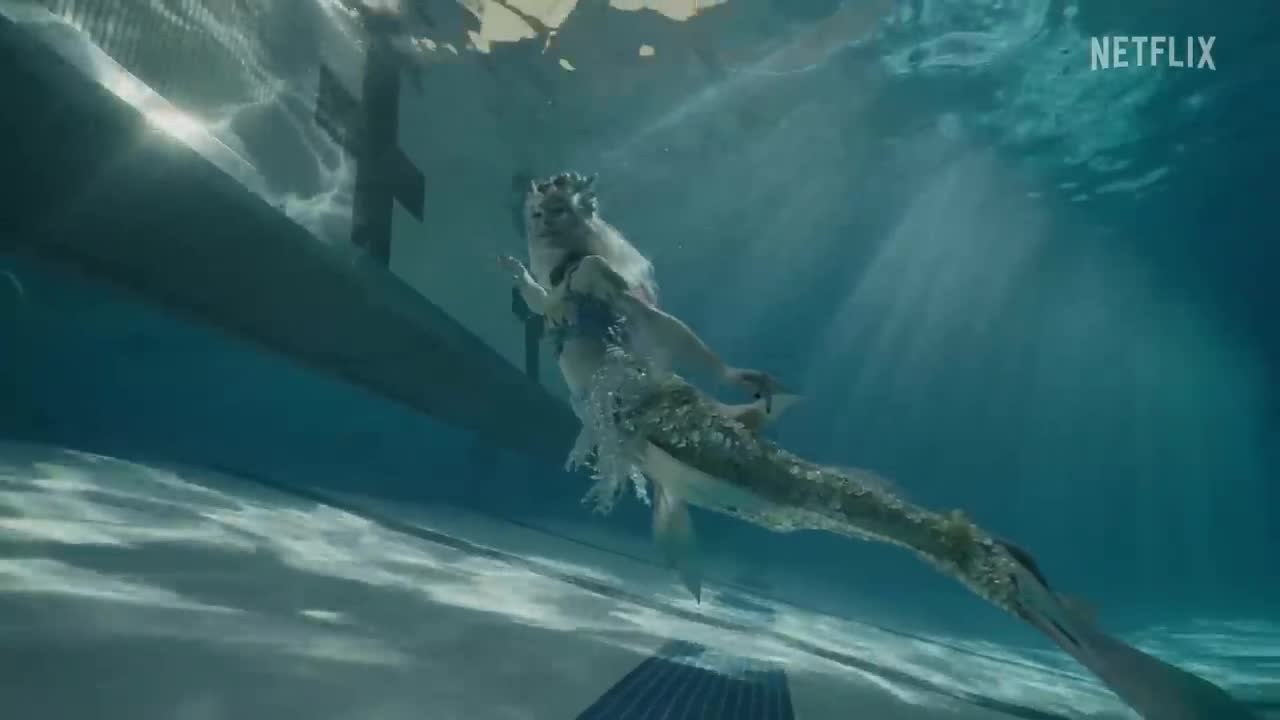
Mermaid Sparkles sparkling.
This Netflix documentary completely focuses on real life mermaids, “aquatic performers” if you will, and their efforts and challenges in a niche hobby and industry. It dips into the history of this performance style, beginning at Weeki Watchee Springs seventy years ago, to absolutely contemporary performers and their struggles. I love the real world impact these kind of fantastical concepts can have on us, and the wonder they generate. Also I’m an absolute sop for dreamers reaching for the stars, for example Mermaid Sparkles pictured above, who lives in land locked Arkansas.
So writing this up, I just put it on in the background… and then watched the last three of the four episodes in one go. This is ostensibly just a documentary about some niche performers, but also gives us a great example of how modern communities can form; and over the four episodes provides us with at least two solid examples of caring leadership that comes from a passion for your work, but the benefits of that leadership to both the leader, and the organisation, when you pick the right people to care about.
Double Fine PsychOdyssey
This is yet another well made documentary, this time on the development of the video game Psychonauts 2. You can find the first episode here. It’s a long series, which was interesting to watch in detail, and appeared to be authentically made, with close co-operation of the subjects. It was good to see the tensions in the company, how it works under the charasmatic leadership of Tim Schafer, but it was just something that dropped out of the rotation. If you’re interested in the subject, especially if you’re considering a career in video game design, it’s worth checking out.
Oh No
And to finish, the worst things I watched this “week”.
Lackadaisy
This doesn’t deserve to be here.

Lackadaisy.
Lackadaisy is prohibition adventures, but with animated cats - which had a nice feel but very not for me. The thirty minute pilot is on YouTube here, and at the time of writing has over ten million views. While a minor detail I found the animation artifacts distracting - i.e. the circles and orientation lines that would appear and disappear for character’s faces - especially as I assume they had been added afterwards. And it didn’t engage me. But it’s engaged many others, do see if it’s for you.
The Sword and the Sorcerer
Similarly, maybe this film doesn’t really deserve to be here. “The Sword and The Sorcerer” is very much of its time, of the style of a “Hawk the Slayer” or a “Krull”, but more “80’s fantasy for teenage boys” but less coherent. I found the plot confusing, as it revolves around the struggles of a prince and princess, but I wasn’t sure who they were or even who many there were. Also there is a legendary tri-sword that seems to appear and disappear and reload… yes, reload… when needed. As I say, very much of its time, boobs one minute, a comedy soundtrack the next, bloody violence the next, and on we go. I might look out for this on sites such as Rifftrax and MST3K, but we had fun watching it uncommented… the trailer will tell you all you need to know.
Citadel
I like the ambition of “Citadel”, apparently planned as a set of series in different national markets, covering the exploits of the Citadel spy organisation and their efforts to thwart the evil Manticore group. It comes with a reported 300 million dollar budget, which is clear on the screen, but not in the writing. Of all things True Lies, mentioned above and on a similar subject, had more realism and more charm. I mean I only gave it an episode, but that was enough, everyone sounded like a snappy spy film character, but written by AI.
Glitter Force

Glitter Force.
As I’m being comprehensive - I also watched the first episode of “Glitter Force” on Netflix, as it came up in a search for Fantasy content. The Netflix summary is “Five preteen girls learn they’re a legendary superhero squad known as the Glitter Force. Their mission? To defend Earth from evil fairy-tale villains.”, so I think the most appropriate thing to say is that I am not the intended audience, this looks like an indicative trailer of the content and style.
Similarly…
Unicorn Warriors Eternal
“Unicorn Warriors Eternal” is very similar to that in some ways, very very different in others, and very weird. From the creator of Samurai Jack - you’ll know if it’s for you or not pretty quickly. First episode on YouTube, or streamling on Channel Four. Or another trailer to try out.
Girls und Panzer

Girls und Panzer.
Anime girl school portrayal combined with mid twentieth century tank combat, Girls Und Panzer doesn’t deserve to be here either, it’s just out of the range of the cultural touchpoints I’ve grown up with so it’s not so much on a spectrum of good or bad, but is maybe just intriguing and perplexing.
Knightfall
As opposed to “Girls und Panzer”, “Knightfall” was just frustrating. It’s about the Knights Templar looking for the grail, or something, fifteen years after a crusade. I thought I’d try watching it in the background while working, to help generate medieval thoughts… but in the first episode, from the muslim siege engines firing indiscriminately on a castle they’re attacking, to the obscure hidden message being discovered and interpreted at the right time, I could see it was not for me. Check out the trailer if you’re particularly into armour, death, or shouting.
The Watcher
Looking to make the most of my Netflix subscription, The Watcher has an interesting conceit, a new family moving into a community and a house that both have a deep and disturbing history… but I just found it vague. I was put off by weird people being weird without consequence, especially with all our modern technology and the possibilities that gives to record or document or share or publicise or research or… you get the idea. I can believe in superheroes and time-travel, sometimes at the same time, but not that lack of ideas by protagonists.
Needle in a Timestack
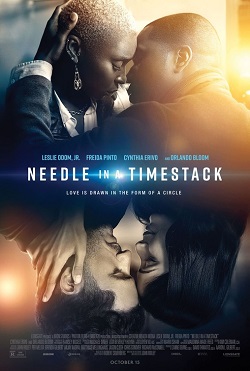
Love is drawn in the form of a circle.
But even with The Sword and the Sorcerer being in this “week”, I have saved the worst until last.
“Needle in a Timestack” reminds me of my review of Synchronic. The plot of this film centres around the effect of time travel - but those effects are never really explained or explored, but are key to the movie making sense.. so it doesn’t make sense.
In the film if a time traveler goes on a “time jaunt” it only seems to affect certain people, and the effects are limited in both time and in their physical range - for some reason. A time jaunt that changes time causes a “time wave”, which is a visible and relatively slow wave that changes reality - except people’s brains and memories, which gradually adapt over a matter of hours. The reason for this is also not explained.
And as the stakes of the plot focus on time travel, but it’s not explained, the stakes aren’t explained. I liked the idea put forward by the trailer of a conflict over a timeline, and the potential issues with trying to retain your identity in that… but instead the film is ponderous. It is a relationship based drama with an inconsistent Sci-fi theme placed over the top. The effects of time waves aren’t universal, some aspects of reality can be “chrono-protected”, but as you’re undoubtedly expecting by now, there’s with no explanation of how that works, or where chrono-protection is and isn’t used, or how or why it is limited.
Or, of course, why time-jaunts appear to be the province of the super-rich, and yet somehow accessible to the less wealthy characters in the film - without consideration of the wider picture, where you’d expect billionaires and governments to be constantly warring over this technology.
There’s no shortage of talent on-screen, and the CGI for the technology - paper thin transparent screens and phones and displays - is impressively flawless4. But the plot made no sense, and in some way all the characters felt like the proverbial “sexy lamp”.
Epilogue
I realise these quarterly “weeks” don’t really work, and this is a huge chunk of text, but as I said last time - I’ve enjoyed putting this together, especially aiming for nothing more than a kind of glorified listicle. While these always take longer to write than I expect, and I’m pretty sure I can still count the readership on one hand, I find it really useful to collate and curate my thoughts in this way. For example, for me, I didn’t realise quite how many sports documentaries I’d watched, or how time-travel was a reoccuring theme, or how well Caves of Steel worked as a Sci-Fi detective story compared to how poorly Needle in a Timestack worked as a Sci-Fi romantic drama.
In addition I’m increasingly aware of just how much I enjoy treating fantastical phenomenon in a realistic way, so having an opportunity to compare how that failed in Secret Invasion with how it succeeded in Nimona was useful and enlightening. Journaling is not for me, but once I get some momentum going, journaling through a blog is. Do consider doing the same, blogging or journaling or something inbetween.
-
In my weeknotes terms a “week” is the time period between when I last wrote my weeknotes and now. Your week may be shorter than mine. ↩︎
-
As a spoiler of an aside… this is how you handle shape-shifting, not the way Secret Invasion has. ↩︎
-
I’d love to take credit for this insight but I read it on the Internet… somewhere, in the last three months or so. ↩︎
-
Alright, there’s maybe one shot where it was iffy, but on my old TV watching on a Netflix 1080 stream, this aspect of the film seemed flawless. ↩︎
